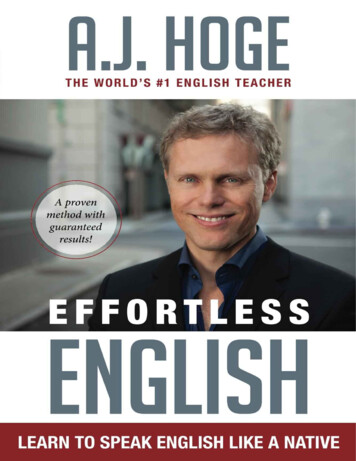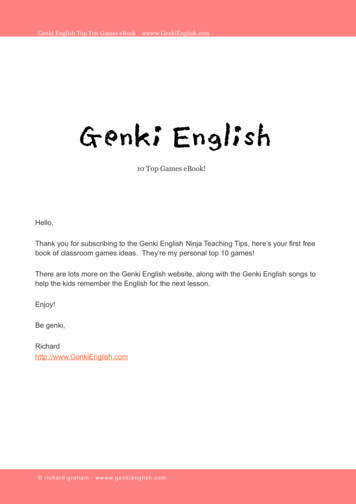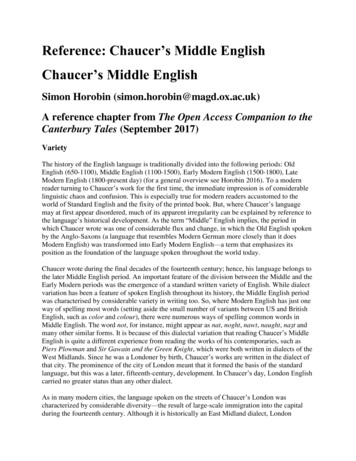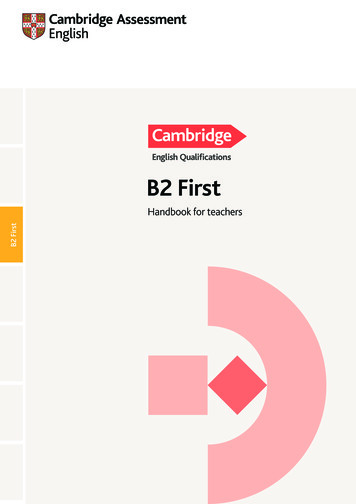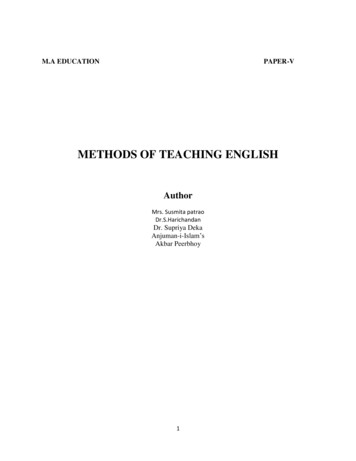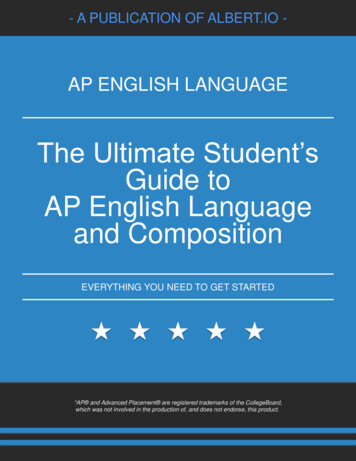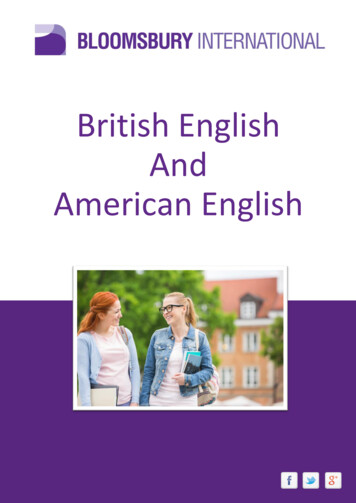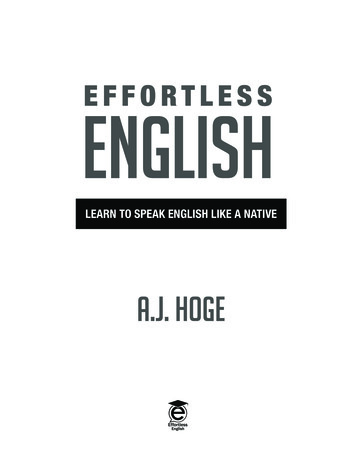
Transcription
AS andA LevelEnglishLiteratureLiterary terms: A guide forstudents
Literary terms: A guide for studentsLiterary terms: A guide for studentsContentsIntroduction . 2Frequently misused words . 3General terms: . 4Poetry . 8Genres . 8Analytic vocabulary . 10Drama . 11Genres . 11Analytic Terms . 12Prose . 13Genres . 13Analytic Terms . 141
Literary terms: A guide for studentsIntroductionThe terminology below may be used support your reading and response to literature. Itwill also help you access any critical reading on your specified literary texts, alongsideany specific glossaries that have been provided in Edexcel’s support materials.To produce high quality analytical writing you need the tools to do so and the ability touse them precisely. Skilled writers of literary analysis use subject-specific terminology toconstruct coherent, accurate arguments. The terms below should not be used as anexercise in ‘feature spotting’ in a literary text. ‘The writer uses a metaphor’, for example,offers no analysis of ‘how’ and ‘why’. Good literary analysis should consider the writer’sparticular choices in constructing a literary text, and the precise effects of these, usingappropriate terminology. The list below is by no means exhaustive; whole books havebeen written on the subject! However, these materials will give you a broad range ofterms used to analyse English Literature and some general guidance about how to usethem.When writing about English Literature you are likely to be confronted by three differenttypes of complexity in the vocabulary you use. The first is words which are difficult inthemselves, or describe difficult concepts such as alienation effect. The second iswords whose meaning has changed over time, such as sentimental. The third is wordswhose popular meaning differs significantly from their academic or root meaning. Thisguide mostly concerns the first two categories but begins with a list of frequentlymisused words.
Literary terms: A guide for studentsFrequently misused wordsLiterary termsExplanationIncredibleLiterally means ‘cannot be believed’. You might use itacademically to say that the events in Angela Carter’s The MagicToyshop (1967) ‘range from the credible to the incredible’; youwouldn’t use it as a word of praise: ‘Angela Carter is incredible!’IronicOften used to mean ‘unfortunate’ but should mean ‘turning outagainst expectation’ or, in the case of human expressions,sarcastic instead of sympathetic. An ‘ironic smile’ is mocking notfriendly. Irony is the essence of poetic justice.FigurativeFigurative language should introduce a comparison, such as asimile or metaphor.LiteralLiteral language has no metaphorical intent.MassiveOnly use this word about objects that have mass. A mountainrange can be ‘massive’; popular opinion cannot be. Words like‘extensive’ or ‘significant’ or ‘widespread’ are often moreaccurate.PatheticUsed to mean ‘useless’ instead of ‘inspiring pathos’. ‘Pathos’means ‘appealing to the emotions’.RadicalPopular culture is used to this word being shouted byskateboarders or mutant turtles to mean ‘great!’ It is actuallyfrom the Latin word ‘radix’ (root). A ‘Radical MP’ in 19th centuryBritain was one who wanted to make changes to fundamentalaspects of society; in other words to go to the root of a problem.3
Literary terms: A guide for studentsGeneral terms:Literary termsExplanationAllegoryAllegory is a rhetorical device that creates a close, one-to-onecomparison. An allegorical comparison of 21st century Britainto a hive might point out that Britain and the hive have queens,workers and soldiers.BurlesqueSatire that uses caricature.ColloquialColloquial language is the informal language of conversation.DenouementThe culmination or result of an action, plan or plot.DiatribeAn impassioned rant or angry speech of denunciation.EmpiricismAs a philosophy empiricism means basing knowledge on direct,sensory perceptions of the world. Empirical means seeking outfacts established by experience not theory.ForegroundTo emphasise or make prominent.FormThe type of literary expression chosen by an authorGenreA more precise definition of the different literary forms. Thereare general categories, such as poetry, drama, prose. There arespecific categories within these larger divisions, so asonnet is a specific genre within the larger genre of poetry.HypePossibly derived from hyperbole but usually used to indicate anattempt to deceive the public by over-rating the value of acommodity or experience.HyperboleThe use of exaggeration for effect: ‘The most daring, prodigious,death-defying feat attempted by man or woman in all humanhistory!’IntertextualityA term describing the many ways in which texts can beinterrelated, ranging from direct quotation or echoing, toparody.LudicFrom the Latin word ‘ludo’, a game. A text that plays gameswith readers’ expectations and/or the expectations aroused bythe text itself. Tom Stoppard’s The Real Inspector Hound(1968) is both a parody of Agatha Christie’s murder-mysteryplay The Mousetrap (1952) and a ludic text that arousesaudience expectations there will be a plot and a mystery to solvebut provides no solution. Here the audience is first enticed, thenteased and finally frustrated.
Literary terms: A guide for studentsMetaFrom the Greek meaning ‘above or beyond’. Metaphysics’ is‘above’ or ‘beyond’ physics. ‘Meta’ is often used in compoundwords: metatext, metatheatre, etc. These words usuallydescribe moments when a text goes beyond its own fictionalityor makes readers/audience aware of the conventions of itsfiction. An aside could be described as a ‘metatheatrical’event. The audience offstage hear words the audience onstagecannot hear. Brecht’s alienation effect(Verfremdungseffekt), where a character suddenly addressesthe audience directly, breaking the convention that thecharacters on stage do not notice the audience during a play, isa metatheatrical effect.MetaphorA comparison that creates a direct correspondence ‘society is ahive’ unlike a simile.ModernismThe name given to experiments carried out in poetry, prose, andart from around 1920-1939. The relationship of Modernism withtradition is frequently complex but the appearance of aModernist work is usually aggressively different to that of anolder text. Often spelt with a capital: ‘Modernism’,‘Modernity’ to distinguish the word from ‘modern’ meaning ‘upto date’.Narrator/narrativevoiceA narrator or a narrative voice conveys a story. Sometimesthe narrator’s presence is emphasised, as in the ‘Dear Reader’convention employed by Charlotte Bronte’s Villette (1853). Thisis called a first person narrative. Sometimes the story is toldby an unseen author, as in George Orwell’s 1984 (1949). Thisis called a third person narrative.Some stories are told by an unreliable narrator. In these talesreaders are expected to work out that the person who tells thestory is biased, partial or mistaken in the views they putforward. The narrator of Kazuo Ishiguro’s The Remains of theDay (1989) is a narrator of this kind. By contrast theomniscient narrator maintains a god-like view of the story inorder to provide shaping and commentary. This is theviewpoint usually adopted by George Eliot (1819-80) in hernovels.OxymoronLanguage device where two opposite words or meanings areused side by side e.g. ‘sour sweet’.ParodyThe reducing of another text to ridicule by hostile imitation.Pathetic FallacyThe use of setting, scenery or weather to mirror the mood of ahuman activity. Two people having an argument whilst a stormbreaks out is an example. The technique is used to make surethe feelings of readers or audience are moved.See pathetic.5
Literary terms: A guide for studentsPoetic JusticeA literary version of the saying ‘hoist with his own petard’. Thetrapper is caught by the trap in an example of ironic but aptjustice. Despite the word ‘poetic’, examples usually turn up intexts which are narrative and not necessarily poems.Point ofView/viewpointThese words look as though they should be interchangeable butthis is not always the case. A point of view is an opinion; aviewpoint can also be the foundation on which an opinion isbased or, literally, a place from which a view can be enjoyed.PostmodernismA complex term. Postmodern texts tend to be aware of theirown artifice, be filled with intertextual allusions, and ironicrather than sincere.ReportageLiterally means reporting news but in literary criticism the wordoften means the inclusion of documentary material, or materialwhich purports to be documentary, in a text. Mrs Gaskell’s MaryBarton (1848) contains documentary details about life in theManchester slums that Mrs Gaskell observed first hand.SatireA destructive reduction of an idea, image, concept or text. Itcan employ exaggeration, mimicry, irony or tone.SemanticsThe study of how words create meaning.Semantic fieldThe area of language from which a text draws most of itstropes.Signifier/SignifiedAccording to Ferdinand de Saussure (1857-1913) meaning iscreated by the partnership of signifier (the indicator) andsignified (the indicated). Together they make up a sign. Latersemanticists and Postmodernists have questioned if the signis as simple as Saussure’s ideas imply.SimileA comparison introduced with ‘like’ or ‘as’: ‘society is like a hive’.Stream ofConsciousnessThe removal of conventional sentence structures and grammarin an attempt to imitate the free flow of thoughts. VirginiaWoolf’s Mrs Dalloway (1925) and To the Light House (1927) areexamples.SymbolA symbol is more independent than a metaphor and lessspecific than an allegory. Where both metaphors andallegories have precise meanings or are ways of explaining acomplex concept, symbols are often elusive in their exactmeaning. The lighthouse of Virginia Wolf’s To the Lighthouse(1927) is frequently seen as symbolic but opinions differ as towhat it might represent.SymbolismThe process of creating or detecting symbols within a work.Sometimes critics will talk of a text symbolising a larger
Literary terms: A guide for studentsconcept or idea, irrespective of the author’s intention.Many critics have interpreted T .S. Elliot’s The Waste Land(1922) as symbolising post-WWI Britain, though Elliot alwaysdiscouraged such an interpretation.TextA Postmodernist concept designed to eradicate distinctionbetween literary genres. Some forms of Postmodernismcollapse all types of human experience, including history, intotext.TransgressiveThe crossing of a boundary of culture or taste, usually with asubversive intention. Vladimir Nabakov’s Lolita (1955) can bedescribed as a transgressive text thatchallenges assumptions about sex, love, the age of consent andmoralityTropeAny of the devices (metaphors, similes, rhyme etc.) wherebyart language differentiates itself from functional language.ValoriseTo invest with value.Writing BackA term which describes the appropriation of a text or genre anda rewriting in response. This is a technique frequently employedby Post-colonial writers or feminist writers. Rastafarianismreinterprets the Bible as text of black liberation; MargaretAtwood’s The Handmaid’s Tale (1985) rewrites the Bible toexpose its anti-feminist implications.7
Literary terms: A guide for studentsPoetryPoetry and song may well be the oldest form of human literary activity. The epic poemsof Homer, The Iliad and The Odyssey, were regarded as the foundational works ofWestern culture by the Romans and the Western civilisations that followed the Romans.GenresLiterary termsExplanationBalladA word that has changed in meaning. Now it signifies anemotive song that usually involves large production andprojection. In the literary world, to folklorists a ‘ballad’ is a songthat tells a story, whereas to poets the ballad verse-form is asimple AB,AB, rhyme structure with simple rhythms. It wasassociated with oral culture and carried little cultural prestige.Wordsworth and Coleridges’ Lyrical Ballads (1798) contains bothtypes of literary ballad.Classical, or NeoclassicalMovements that believe all writing or art should imitateprecedents and genres created by the writers or artists of theclassical civilisations of Greece and Rome. In Britain the late17th to early 18th century, from Dryden to Johnson and Pope,was dominated by this belief.EffusionA word meaning a spontaneous expression. It was a conceptvalued by the Romantic poets. Wordsworth uses the word in his‘Extempore Effusion upon the Death of James Hogg’ (1835).ElegyA poem lamenting a dead person or persons. The term elegiacmeaning ‘mournful’ or ‘conveying loss’ derives from this genre.EpicA long poem concerned with large events of conflict. An epic isfrequently seen as displaying and testing the values of thecivilisation that produced it. Consequently it has high culturalprestige. Virgil’s Aeneid (19 BC) consciously tries to definewhat is distinctive and significant about Rome and its civilisation.Milton’s Paradise Lost (1674) is the most famous Englishexample, though this moves beyond England to discuss therelationship between god and man.EpithalamiumA poem celebrating a wedding.Mock-epicA poem employing the devices of an epic to create a parody ofthe epic’s grandeur. Alexander Pope’s The Rape of the Lock(1712) is a powerful 18th century example.OdeA lyric address, originally sung to music. ode
Literary terms: A guide for studentsPastoralAn idealised depiction of rural life, sometimes set in ‘Arcadia’; anEden-like land. A concept strongly active in the visual arts aswell.RomanticAn almost impossible to define word, applied to movements fromthe late 18th century onwards who valued feelings abovethought and originality above derivation.SonnetGenerally refers to a 14 line poem with a strict rhyme scheme.Petrarchan sonnets (post 1374) usually have the rhyme schemea-b-b-a, a-b-b-a, and either c-d-e-c-d-e , c-d-c-c-d-c,or c-d-c-d-c-d. Shakespearean sonnets (post 1600) end with acouplet: a-b-a-b, c-d-c-d, e-f-e-f, g-g.As it was introduced into Britain through court circles in the early16th century, the 14 line form had high cultural prestige. As theword derives from the same root that gives the word ‘song’(Latin sonus), it was sometimes applied to lyric poems in the16th century that are more than 14 lines long.LyricMost narrowly ‘lyric’ refers to words designed to be sung; moregenerally a ‘lyric poem’ can be one in which the song-likecharacteristics of poetry predominate.9
Literary terms: A guide for studentsAnalytic vocabularyLiterary termsExplanationAlliterationThe repeating of the initial letter for aesthetic effect: ‘the bright,broad, blade’.AssonanceThe repeating of vowel sounds for aesthetic effect: ‘low, close,clouds’.ChorusIn songs a few lines that are repeated at the end of each stanza.In Greek drama a group of people on stage who act as acommunal character and recite verses.EnjambmentThe flowing on of a line of poetry so there is no pause at the endof the line:Sir Thomas Wyatt: ‘They flee from me’:1 I have seen them gentle, tame, and meek,2 That now are wild and do not remember3 That sometime they put themself in danger4 To take bread at my hand; and now they ere lines 1 and 4 pause at the end of the line; lines 2 and 3 donot; they flow on.RefrainThe repeating of a single line in a poem, often the last line of astanza.RepetendA recurring word of phrase, not necessarily as formally arrangedas a refrain.SibilanceThe aesthetic use of the hissing ‘s’ sound; ‘So many slights, somany sighs, so many sneers ‘StanzaThe divisions of a poem.VerseThe word is sometimes used to refer to poetry in general as in‘written in verse, not prose’ but can be used to mean the sameas stanza.
Literary terms: A guide for studentsDramaIn ancient Greece drama was closely connected with religious ritual and may haveevolved from religious celebrations. There has remained a powerful link between dramaand religion throughout human culture, from the performances of a shaman to theceremony of the Catholic High Mass.GenresLiterary termsExplanationAbsurdisttheatre/Theatre ofthe AbsurdA genre of plays in which apparently impossible or ridiculousevents make a statement about the strangeness and irrationalityof existence. The term is used to classify the plays of writers likeAlbee, Beckett and Ionesco.Agit-prop(AGITationPROPaganda)A piece of drama that exists to make a political point. Oftenperformed in the street.Brechtean DramaA drama designed to confront its audience directly throughdevices like the alienation effect, to put forward a politicalpoint of view. In Brecht’s case this was used to advance leftwing politics. Sometimes this type of play is called ‘Epictheatre’, especially when created by other playwrights, such asErnst Toller.Classical DramaDrama observing the rules of Classical Greek and Roman drama,following the critic Aristotle’s codification of three unities’: Unityof time (action takes place within 24 hours), unity of place (onlyone scene throughout), unity of plot (no sub-plots) (322BC).Epic theatreSee ‘Brechtean Drama’FarceA comedy featuring exaggerated situations and physical humour,usually based around the attempt to preserve respectability.The adjective ‘farcical’ is less specific, usually referring tosome event that becomes absurd.HappeningA spontaneous or semi-spontaneous event in a public space thatcombined theatre and art. The so called Pop Artist of the 1960s,such as Robert Rauschenberg, pioneered such experiences.Masque16th/17th form of court entertainment with music, dancing, anddialogue but emphasising spectacle, costume and theatricaleffects rather than plot.Realistic DramaAn attempt to represent life on stage with the minimuminterference from convention. The defining metaphor is thatviewing a realistic play should be like looking into a room withone wall missing.11
Literary terms: A guide for studentsShakespeareanDramaThe name conveniently given to British drama of the Elizabethanand Jacobean period that ignored the rules of classical dramato use large time-spans, sub-plots and many scenes.Theatre of theAbsurdSee ‘Absurdist theatre’.Analytic TermsLiterary termsExplanationCatharsisClassical scholars argue about the original meaning intendedby the ancient Greeks, but has come to mean an emotionalrelease engendered by an intense experience.Dramatis personaeLatin term for the list of characters in a play.HamartiaClassical scholars argue about the shades of meaning theword has in the original Greek but has come to mean a fatalmoral flaw in a protagonist of a tragedy.HubrisNow usually used to designate overweening pride in aprotagonist of a tragedy; some Classical scholars argue thatthe original word is more complex.Alienation effect(Verfremdungseffekt)The use of devices that disrupt the illusion of realistictheatre, such as the cast speaking or singing directly to theaudience, or holding up signs or slogans.AsideA remark to the audience which other characters on stage donot hear. In effect a device used to make a character’s innerfeelings evident.ExeuntUsed to indicate several people leave the stage.ExitUsed to indicate one person leaves the stageMonologueA play that consists of the speech of one character with noother cast. Alan Bennett has written many monologuesinterpreted by famous actors such as ‘A Cream CrackerUnder the Settee’ (1988) for Thora Hird.SoliloquyA solo speech by a character, usually taking place when s/heis alone on stage. Like an aside, it is a way of allowing acharacter’s thoughts to be overheard.VerfremdungseffektOriginal German term for ‘alienation effect’.
Literary terms: A guide for studentsProseIt is tempting to think of any prose piece as being ‘a novel’. The term comes into beingrelatively late, as is testified by the name: ‘novel’ as in ‘novelty’: ‘something new’. Theprose of the middle ages to the Eighteenth Century is best classified as chronicle orRomance. During the eighteenth century the modern novel developed in variousgenres such as the Gothic novel, the epistolary novel, the picaresque novel and thesentimental novel.GenresLiterary termsExplanationChronicleA list of events. Some chronicles may be in verse. Theemphasis tends to be on action not inner life. Somechronicles are factual, some are not. Geoffrey of Monmouth’sHistory of the Kings of Britain is a text written in the 12thcentury that looks like a historical chronicle but is a mixtureof legend and imagination.EpistolaryA novel written in the form of an exchange of letters(epistles).GothicAt its simplest the use of medieval and/or supernaturalelements to create a horror story. Nowadays the word is oftenused to describe any story with antique horrors within it.Magic-realismA novel written in a realistic style which incorporatesimpossible or unlikely events. Films may be described asmagic-realist as well. Behn Zeitlin’s 2012 film Beasts ofthe Southern Wild combines realism in the depiction of a floodin bayou country with fantasy, showing the rampagingmythical aurochs that the child Hushpuppy fears have beenreleased by the flood.PicaresqueA novel where the protagonist’s travels and encounters aremore important than the protagonist’s character. Famousexamples include Henry Fielding’s Tom Jones, (1749)which incorporates elements of mock-Epic, parodyingHomer. Can be seen as heir to the inter-leaved Medievalromances.RomanceA medieval prose or poetry text that tells a story in whichbarely possible and supernatural events are an essentialfeature of the action. One of the mostsophisticated examples in Gawain and the Green Knight, amid- late 14th century poem. Simon Armitage did atranslation in 2007.SentimentalOriginally a person who was sentimental was in touch withtheir feelings, the sentimental novel is a literary genre ofthe late 18th century. One such example being Oliver13
Literary terms: A guide for studentsGoldsmith’s The Vicar of Wakefield (1766) in which a family’slove is tested by disaster after disaster.Realistic/NaturalisticA confusing distinction in so far the two terms are sometimesused as if synonymous but are sometimes used todifferentiate stories that are factual in style and intentionfrom those which are factual in style but symbolic inintention. There is disagreement about which term signifieswhich type of writing.In the 19th century Stephen Crane and Zola wereregarded as naturalistic writers, whose stories made criticalpoints about society, whereas writers like William DeanHowells was regarded as a realist, whose stories simplydocumented contemporary American life with littlecontroversy.The Marxist Georg Lukács (1885–1971) inverted the meaningof the two words. For Lukács a realistic story selects atypical incident in order to reveal the nature of the realitybehind a political or cultural system, whereas a naturalisticstory uses fact to present a neutral orsubjective world view. The terms can be used to describegenres of writing or styles of writing.Analytic TermsMany of the analytic terms used for prose have already been covered above.Literary termsExplanationInterleavingThe telling of several stories in one text; the stories are interwoven with each other. Edmund Spencer’s poem The FaerieQueene (1590/1596) used this narrative technique.With thanks to: Jonathan Brockbank, Department of English and Related Literature,University of York
The terminology below may be used support your reading and response to literature. It will also help you access any critical reading on your specified literary texts, alongside any specific glossaries that have been provided in Edexcel’s support materials. To produce high quality analytic



